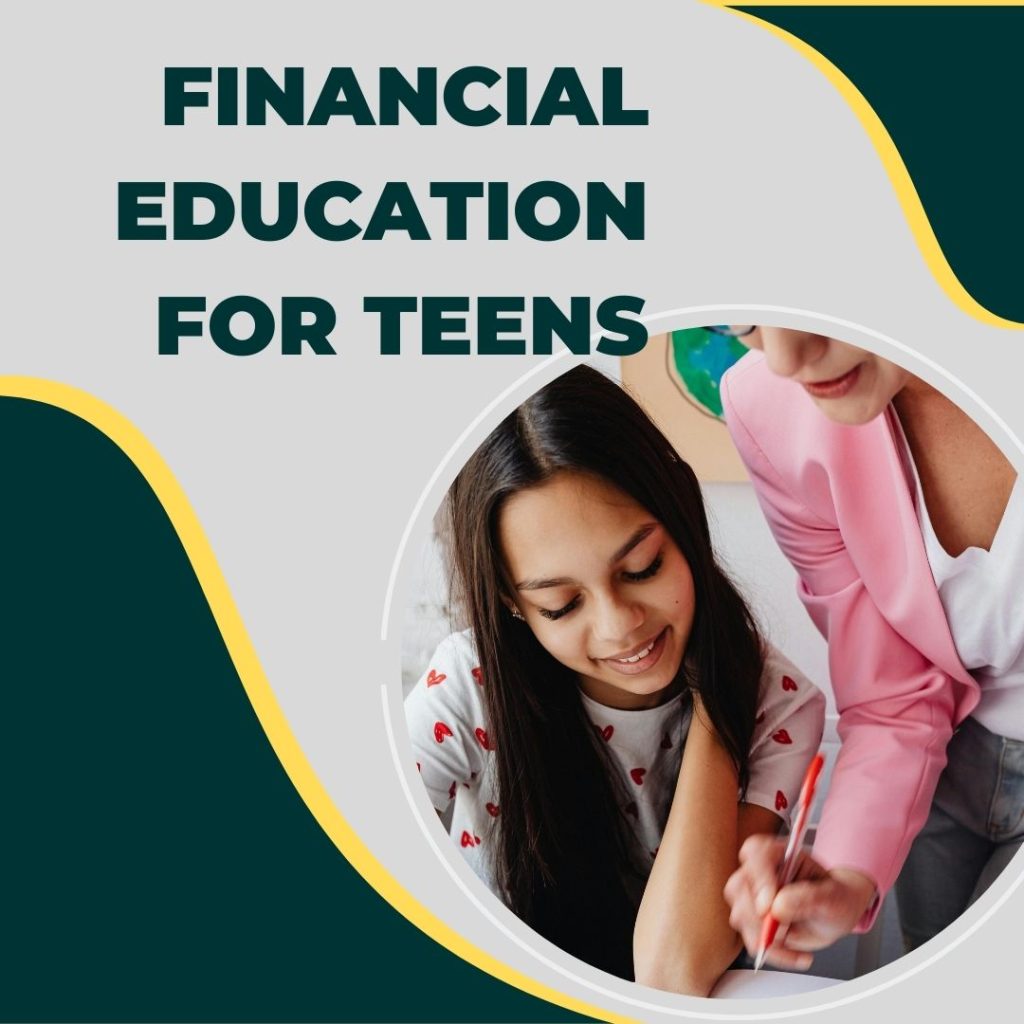Financial Education for Teens: Smart Money Skill Unveiled
Financial education is crucial for teens to manage personal finances effectively. It empowers them with the knowledge to make informed decisions about money.
Financial education for teens opens the door to understanding savings, budgeting, and the basics of investing. It’s a stepping stone towards financial independence and can lead to healthier financial habits in adulthood. Introducing young individuals to concepts such as credit, loans, and interest rates also prepares them for future financial responsibilities like college funds or purchasing a car.
This type of education is not just about managing money; it’s about shaping the future financial wellbeing of teens by providing them with the tools and confidence to navigate the economy of tomorrow. As they edge closer to adulthood, grasping the significance of financial planning, the impact of taxes, and the importance of saving can set teens on a path to achieving their life goals while avoiding common financial pitfalls.
The Importance Of Financial Literacy For Youth
The Importance of Financial Literacy for Youth is undeniable in today’s economy. Learning how to manage money at a young age sets the foundation for financial stability later in life. Educating teens about finances can lead to responsible money management, fewer debts, and better saving strategies. It opens doors to understanding credit, investment, and the power of compound interest, ensuring a future of informed decisions and economic self-sufficiency.
Developing Responsible Spending Habits
Good spending habits start young. Teaching teens to be cautious with their purchases can prevent impulsive buying. It is imperative that they learn to differentiate between wants and needs. A structured financial education encourages planning and budgeting which can lead to financial discipline.
- Create a budget spreadsheet
- Track expenses weekly
- Set short and long-term financial goals
These tools help youth think critically about their spending. By doing so, they are more likely to avoid unnecessary debts and save for important milestones.
The Lifelong Benefits Of Early Financial Education
Early financial education has lasting benefits. Knowledge about finance pays dividends across a lifetime. It contributes to healthier financial behaviors and can lead to:
| Benefit | Description |
|---|---|
| Smart Investment Choices | Understanding when and how to invest ensures growth of personal wealth. |
| Credit Management | Knowledge of credit scores and loans enables better decision-making. |
| Retirement Preparedness | Planning for retirement early ensures a secure and comfortable future. |
These outcomes promote economic well-being and are essential building blocks for a prosperous life.

Basic Financial Concepts Every Teen Should Know
Grasping finance early can shape a teen’s future. It’s crucial to understand money matters. Below unfolds the knowledge that sets them up for success.
Budgeting Essentials
Budgeting is a financial plan for your money. It guides spending and saving. Teens should know how to budget. Here’s why:
- A clear budget prevents overspending. It helps you stay within limits.
- It allows for saving up for big purchases or emergencies.
- Understanding cash inflow and outflow builds financial discipline.
Begin with income sources like allowances or part-time jobs. List all expenses, such as snacks, games, or savings. Subtract expenses from income. This result is the starting point for budgeting.
| Income Source | Amount ($) |
|---|---|
| Allowance | 50 |
| Part-time Job | 100 |
| Total Income | 150 |
| Expense | Amount ($) |
| Snacks | 20 |
| Games | 30 |
| Savings | 50 |
| Total Expense | 100 |
| Balance | 50 |
Understanding Saving Vs. Investing
Saving and investing are ways to use money wisely. Both secure future needs but differ:
- Saving means putting money aside, usually in a bank.
- Savings are for short-term goals or emergencies. It is safe and accessible.
- Investing is using money to make more. It’s for long-term growth.
- Investments can be in stocks, bonds, or mutual funds. They carry more risk.
Start a savings account for immediate needs. Consider investing as you grow your savings. Remember, invest smart and early for the best rewards in the future.
Earning And Managing Money
Understanding how to earn and manage money is a vital life skill for teens. It opens doors to financial independence and smart decision-making. From part-time jobs to entrepreneurial ventures, there are numerous ways for teens to earn money. However, earning is just the first step. Managing that money effectively is key to building a strong financial future.
Part-time Jobs And Entrepreneurial Ventures
Part-time jobs offer a chance to earn, learn, and develop work ethics. Teens can explore interests and gain real-world experience. Entrepreneurial ventures, on the other hand, spark creativity and initiative. Whether it’s selling crafts online or starting a lawn care service, these ventures teach valuable lessons in responsibility and perseverance.
Practical Tips For Money Management
Good money management starts with the basics. A budget is essential. Teens should track their income and expenses. Need help starting? Use these tips:
- Save at least 10% of every dollar earned.
- Set financial goals for both short-term and long-term.
- Avoid impulse buys by waiting at least a day before purchasing non-essentials.
Technology can also play a role. Encourage teens to use money management apps that help monitor spending patterns.
| Category | Amount |
|---|---|
| Savings | $50 |
| Entertainment | $25 |
| Personal | $25 |
Remember, the key to managing money is understanding value and making informed choices. With discipline and the right knowledge, financial stability can be attained.
The Power Of Compound Interest
Understanding the concept of compound interest is like discovering a secret superpower for your savings. It’s the fuel that can launch your financial future to new heights, especially when you start early. Grasping how compound interest works is an essential part of financial education for teens.
Illustrating Compound Interest With Examples
Imagine you have $100 in a savings account. With compound interest, your money grows not just from the original amount, but also from the interest it earns over time. Let’s compare simple and compound interest through examples:
| Year | Simple Interest (5%) | Compound Interest (5%) |
|---|---|---|
| 1 | $105 | |
| 2 | $110 | $110.25 |
| 3 | $115 | $115.76 |
| 4 | $120 | $121.55 |
| 5 | $125 | $127.63 |
In this table, you can see how compound interest earns more each year.
How To Harness Compound Growth
Starting early is key to taking advantage of compound growth. Here’s how you can harness this power for your benefit:
- Start Saving Now: The sooner you start, the more time your money has to grow.
- Consistent Contributions: Regularly add to your savings. Even small amounts can make a big difference over time.
- Reinvest Earnings: Put the interest you earn back into the account. This is how compound interest snowballs.
- Patience Pays Off: Compound interest works best over long periods. Stay patient, and watch your savings multiply.
By harnessing the power of compound interest, teens lay a strong foundation for future financial success. A consistent saving habit today can lead to a substantial nest egg tomorrow.
Smart Spending: Needs Vs. Wants
Money talks: it’s time for teens to join the conversation. Learning the art of Smart Spending is a critical step in financial education. Smart Spending teases apart needs from wants, laying the groundwork for savvy financial choices. Let’s dive into how teens can master their money moves.
How To Differentiate And Prioritize
Identifying what’s essential and what’s extra marks the first step towards Smart Spending. Need is for survival: food, shelter, and clothing. Want is for pleasure: games, trendy clothes, and gadgets.
Teens can prioritize with simple steps:
- Write it down: List both needs and wants.
- Set a budget: Put a limit on spending.
- Save first: Depositing savings before spending ensures future safety.
- Ask questions: “Do I need this now?” “Will this wait?”
- Wait it out: Delaying gratification can diminish impulse buying.
Making informed choices between needs and wants is powerful. It sets the stage for financial success.
Implementing A Healthy Spending Mindset
Adopting a mindful approach to spending needs practice. A healthy spending mindset steers clear of impulse purchases and debt traps. It embraces good money habits for long-term benefits.
Teens can cultivate a healthy mindset by:
- Tracking spending: Keep records of purchases.
- Reflecting on values: Spend on things that truly matter.
- Being patient: Long-term goals are worth the wait.
- Researching before buying: Compare prices and reviews.
- Sharing goals: Talk with family about money plans.
A healthy mindset nurtures thoughtful spending and wise financial decisions.

Credit Scores And Borrowing
Understanding Credit Scores and Borrowing is a crucial step for teens. A solid grasp of credit principles sets the stage for financial success. Knowing how scores work and the best ways to borrow money can be golden. Let’s dive into the essentials every teen should know about credit.
The Basics Of Credit
A credit score is like a financial report card. It shows how well you handle money. Banks and lenders look at this score to decide if they can trust you with a loan. A high score can help you get loans with better interest rates. Three main things affect your score:
- Payment History: Making payments on time improves your score.
- Credit Utilization: This is how much of your credit limit you’re using. Less is better.
- Length of Credit History: The longer your history of responsible credit use, the better.
Responsible Use Of Credit Cards
Credit cards can be friends or foes. It depends on how you use them. Here are some tips for staying on the right side:
- Get a credit card with the lowest interest rate and no annual fee.
- Charge only what you can pay off every month to avoid debt.
- Always pay your bill on time to avoid late fees and credit score dips.
- Monitor your account for fraud or mistakes that could hurt your score.
Remember, managing a credit card well can build a strong credit history. This can lead to better rates for bigger loans like for college or a car.
| Score Range | Meaning |
|---|---|
| 300-579 | Poor – Borrowing will be hard and expensive. |
| 580-669 | Fair – Borrowing is possible but not at the best rates. |
| 670-739 | Good – Borrowing comes with decent rates. |
| 740-799 | Very Good – Gets better borrowing rates. |
| 800+ | Excellent – Qualify for the best rates and terms. |
Digital Money Management Tools
Handling money wisely is a critical skill for everyone, especially teens. In the digital age, tools to manage finances are at our fingertips. Let’s explore how teens can harness these digital aids to boost their financial savvy.
Modern Banking And Finance Apps
Banking and finance apps bring the power of a bank to your smartphone. Teens can use these apps to track spending, save money, and even invest.
- Budget trackers help you see where your money goes.
- Savings goals can be set and monitored daily.
- Investment features introduce teens to the stock market safely.
With proper guidance, teens can learn to manage their finances effectively, developing smart habits for the future.
Online Resources For Financial Learning
Learning about finance doesn’t have to be dull. Interactive games, quizzes, and courses are online to make learning fun and engaging.
| Resource Type | Description | Benefit |
|---|---|---|
| Games | Make learning about money fun | Apply concepts in virtual scenarios |
| Quizzes | Test your financial knowledge | Get instant feedback |
| Courses | Dive deeper into money matters | Build a solid financial foundation |
Start exploring these resources and take control of your financial education.
Preparing For The Future: Insurance And Taxes
As teens step into adulthood, they face new financial responsibilities. Two key aspects, insurance, and taxes, can seem daunting at first. Let’s break down these concepts to lay the foundation for a secure future. Understanding these topics now will set teens up for better financial management later in life.
An Introduction To Insurance
Insurance acts like a safety net. It helps you pay for unexpected events. Think of it like a piggy bank that you and many others put money into. When someone needs help because of an unexpected event, like a car accident, this piggy bank helps them out. Different kinds of insurance protect you in various situations.
- Health Insurance: It covers doctor visits and medicine costs.
- Car Insurance: It pays for car repairs if you have a crash.
- Home or Renters Insurance: It helps to fix or replace things in your home if they get damaged or stolen.
Without insurance, you could pay lots of money when bad things happen. With it, you can save your money for other important things, like college or a new bike.
Understanding Taxes And Pay checks
When you start working, you will earn money. That’s great! But not all the money you earn will come to you. A part goes to the government as taxes. Taxes help pay for things we all use, like schools and roads.
| Type of Tax | What It Is For |
|---|---|
| Federal Income Tax | Pays for the country’s needs |
| State Income Tax | Pays for state things, like parks |
| Social Security Tax | Helps older people when they retire |
| Medicare Tax | Pays for healthcare for older people |
Your pay check shows how much money you earned and how much tax you paid. Keep your pay checks to track your money. It will help you when you need to show how much you earn, like when applying for a loan.
Always check your pay check to make sure it’s correct. If something looks wrong, ask your boss about it. Learning about taxes now will help you understand how much money you’ll really take home from a job. And that helps you plan for things you want to do in the future.
Investing In Education: The Value Of Scholarships And Grants
Education opens doors to brighter futures, but it often comes with a hefty price tag. Scholarships and grants can alleviate this burden, allowing teens to invest wisely in their education without accruing crippling debt. Understanding the value of these financial aids is vital for any family planning for college expenses.
Searching For Financial Aid Opportunities
Finding scholarships and grants requires strategy and persistence. Begin early, and use every resource available.
- School counsellors – they provide tailored advice and resources.
- Online databases – sites like Fast web and Scholarships.com offer a vast array of options.
- Local organizations – clubs and businesses often sponsor local students.
- Special interests – pursue aid in areas like athletics, arts, or community service.
Remember, the more you apply for, the better your chances.
Budgeting For College Expenses
Creating a budget for college is crucial. It helps to plan and reduces surprises.
| College Expense | Estimated Cost |
|---|---|
| Tuition and Fees | $XX,XXX |
| Books and Supplies | $X,XXX |
| Room and Board | $XX,XXX |
| Transportation | $X,XXX |
| Personal Expenses | $X,XXX |
Track all expenses and revise your plan as necessary. Scholarships and grants can cover some or all of these costs, so factor those in too.
Real-life Financial Scenarios
Money matters, and for teens, digging into real-life financial scenarios can turn abstract concepts into tangible skills.
Let’s immerse them into situations they’re sure to face and arm them with the savvy to navigate their financial seas.
Role-playing And Financial Decision-making
Imagine stepping into the shoes of a budget-savvy shopper or a stock market investor—a teen’s first taste of the financial world could be exhilarating!
Role-playing activities unveil the nuts and bolts of everyday finance.
- Teens can simulate a grocery shopping experience to understand budgeting.
- They could play the role of an entrepreneur, balancing costs and revenues.
- Investment games teach about stock market basics.
Creating these mock scenarios helps teens make informed, confident decisions when real money is on the line.
Learning From Financial Mistakes
Slip-ups are inevitable, but in the finance world, they can be costly. Providing a safe space for errors allows teens to learn valuable lessons.
- Discuss a time they overspent on something unnecessary.
- Reflect on what temptations led to impulse buys.
- Analyse a bad investment choice and explore alternatives.
Teens will understand that mistakes aren’t failures, but opportunities to sharpen their financial acumen.

Encouraging Teen Entrepreneurship
Teen entrepreneurship offers valuable life lessons and success skills.
Starting young empowers teens to tackle real-world challenges with fresh ideas.
Case Studies Of Teen Entrepreneurs
Let’s look at inspiring teen business stories.
- Mikaila Ulmer: Started Me & the Bees Lemonade at just 4 years old.
- Moziah Bridges: Launched Mo’s Bows, a bowtie company, at age 9.
- Isabella Rose Taylor: Fashion designer who founded her brand at 13.
First Steps In Starting A Business
Curious about launching your own company? Begin with these steps:
- Find a passion: Identify an interest you can turn into a product or service.
- Market research: Learn who might buy your product and why.
- Business plan: Write a simple guide for your new journey.
- Legal matters: Understand the rules for running a business.
- Mentorship: Seek advice from experienced entrepreneurs.
Involving Teens In Family Finances
Integrating teens into family finances sheds light on money management’s inner workings. This practical approach empowers them with essential life skills. Let’s dive into how families can engage their teens in the financial decision-making process.
Family Budget Meetings
Organize monthly family budget meetings to involve teens in financial planning. Here’s how:
- Create an agenda covering income, savings, and upcoming expenses.
- Use a clear, visual presentation, like a spreadsheet or chart.
- Discuss financial goals and encourage teens to share their ideas.
- Keep the tone positive and educational, focusing on collaboration.
Inviting teens to such meetings enhances their understanding of financial priorities and limitations. It also boosts their confidence in handling money matters.
Teaching Teens About Household Expenses
Educate teens about the costs of running a home. It’s crucial they recognize how everyday choices impact the family’s finances. Here are steps to take:
- Show them bills like electricity and groceries.
- Explain the importance of comparing prices and seeking discounts.
- Involve them in money-saving tasks, such as meal planning or coupon clipping.
With this knowledge, teens can make informed decisions when they start managing their own finances. Moreover, they will appreciate the value of money and the effort it takes to earn it.
Frequently Asked Questions For Financial Education For Teens
Why Is Financial Education Important For Teens?
Financial education empowers teens with critical money management skills. This foundation helps them make informed decisions, avoid debt, and achieve financial stability. Learning early sets them up for future success.
What Financial Skills Should Teens Learn?
Teens should learn budgeting, saving, investing, credit management, and wise spending. These skills help them handle money responsibly and build a solid financial future.
How Can Parents Teach Financial Responsibility?
Parents can teach financial responsibility by involving teens in budget discussions, setting savings goals, and encouraging them to earn and manage their own money. Real-life experiences are valuable lessons.
At What Age Should Financial Education Begin?
Financial education can begin as early as childhood. However, the teen years are crucial for more complex concepts like investing, credit scores, and loans. Starting early ensures better understanding later.
Conclusion
Empowering our youth with financial knowledge sets the stage for a future of wise decisions and stability. Teens armed with fiscal understanding are poised to navigate the economy’s waves confidently. Let’s commit to shaping financially savvy adults, starting with robust education during their formative years.
The payoff is a lifetime of fiscal responsibility and success.







